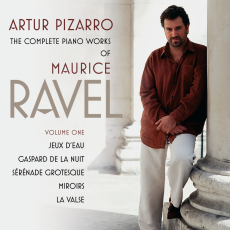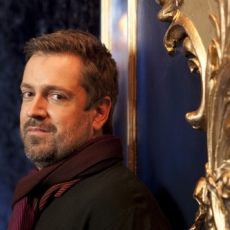Ravel - Pizarro - clavier companion
Two years ago I had the pleasure of hearing Ravel play his own works, not on flat disc recordings but on British Duo Art reproducing piano rolls. These recordings, made many years ago in the last century were played back "live" on a finely restored Steinway grand piano from the 1920s. There he was, Maurice Ravel, playing again, and in fine form I might add.1
I was instantly struck by Ravel's expression - it was drastically different than pianists of later decades who seem to be so intent on revamping his music on the concert stage. To find a pianist who is willing not to promote himself but look after the music itself is refreshing to say the least. To really appreciate Ravel to his fullest one must hear his piano music performed in a chamber setting - not a huge concert hall. It is very intimate music.
In the Ravel piano rolls the tempos are not metronomic and the music is played with less concern for precision and more attention on the emotions. The elegance of each note rings out, but the performances are free of the exaggeration one finds in modern pianists wishing to "make a statement" with their interpretation.
Getting back to the basic spirit of Ravel's music is not an easy task in a day when pianists are coached to punctuate and underline twice the music for audience acclaim. Playing music is not a competitive sport like baseball, or at least it shouldn't be!
Who in today's world can serve up Ravel's music in a manner reasonably close to the composer's takes? The answer is Artur Pizarro, who has recorded the complete works of Ravel for Linn Records.
Linn makes state of the art audio equipment that is world famous, so it stands to reason that when Linn records a pianist we get the finest sound possible. The Linn company's attention to detail in their recordings is much like the care taken by the Duo Art Company in producing piano rolls which, even today, are breathtakingly realistic. This recording (Volume 1 of the set) was made in Lisbon on a Hamburg Steinway D prepared by Nigel Polmaer, and the disc includes Jeux d'Eau, Sérénade Grotesque, Miroirs and La Valse.
Pizarro, a native of Portugal who studied with Sequeira Costa, presents us with a musical color pallet that seems ever so natural. His notes never sound pushed, nor do we hear the mushiness of overpedaling. Pizarro's way with Jeux d'Eau is an excellent example of how well Ravel's music can captivate on its own without elevated theatrics.
Gaspard de la Nuit draws us into the world of Ravel, ever so slowly, never losing the music's child-like softness and character. Miroirs is a delight to the ears - especially the "Alborada del gracioso" and "La vallée des cloches" movements.
The 11th track on the disc is La Valse. When Ravel calls for flashy wildness Pizarro delivers in spades! Play this track first to get a real measure of Pizarro's extraordinary skills. This is a mother lode of musical sonic delights. Thank you, Linn for making the recording and Polmaer for masterfully voicing the Hamburg Steinway. And thank you, Pizarro for your Ravelian magic!
1 Ravel made two sets of piano roll recordings. In 1913 he recorded Sonatine (1st two movements only) and Valses Nobles et Sentimentales for the German firm Welte.
In 1922, he recorded selected movements of ;i+oi+s (Oiseaux tristes and La vallée des cloches), Le Tombeau de Couperin (Toccata), and Gaspard e la Nuit (Le Gibet), along with Pavane pour une Infante Défunte for Duo-Art, a subsidy of Aeolian.
For more information on these recordings, visit www.maurice-ravel.net/pianorolls.

